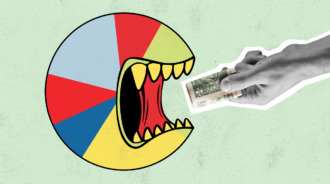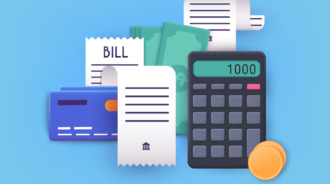

The State Bank of India’s Fixed Deposit Monthly Income Scheme (FD MIS) could be an excellent choice if you have been looking for ways to earn. As an FD MIS account holder, you can earn interest on your fixed deposit investment and receive it each month directly in your linked savings account. The interest earned is taxable, but you can claim tax deductions up to Rs 40,000 annually under Section 80C of the Income Tax Act. The interest may even be tax-exempt if you’re in a lower tax bracket. Read on to learn more about how SBI’s FD MIS works and whether it’s the right fixed-income option for your needs.
How the SBI Fixed Deposit Monthly Income Scheme Works
The SBI Fixed Deposit Monthly Income Scheme lets you earn interest on your fixed deposit balance each month rather than at maturity. Let’s see how it works.
How to Open an Account
Opening an account is straightforward. You fill out an application at any SBI branch, provide ID and address proof, and deposit a minimum of Rs 10,000 to open the account. The account matures in increments of 36 months up to 120 months.
Interest Rates and Returns
Interest rates vary based on the deposit term you choose. As of 2021, rates range from 5.30% for a 36-month term up to 5.40% for a 120-month term for the general public and from 5.80% for a 36-month term up to 6.20% for a 120-month term for senior citizens. The longer your money is deposited, the higher the interest rate. Interest is compounded quarterly and credited to your account each month.
Tax Benefits
The interest you earn is taxable as income. However, SBI does not deduct TDS if your interest income is less than Rs 40,000 in a financial year. Senior citizens have an exemption limit of Rs 50,000. You must report the interest as income when filing your tax return.
Withdrawals and Renewals
You can withdraw your money without penalty on the maturity date. Partial withdrawals are allowed in some cases but may incur fees. Your account will automatically renew at maturity for the same term unless you instruct SBI otherwise. Renewed accounts earn interest at the prevailing rates at the time of renewal.
The SBI Fixed Deposit Monthly Income Scheme provides a solid fixed return and steady monthly income. If you have excess cash you want to put to work earning a stable return over time, this scheme is worth considering.
Tax Benefits of the SBI Fixed Deposit Monthly Income Scheme
The SBI Fixed Deposit Monthly Income Scheme offers some solid tax benefits that are worth considering.
Tax Deduction on Investment
The amount you invest in this FD scheme is eligible for tax deduction under Section 80C of the Income Tax Act, up to Rs. 1.5 lakh per year. It can help lower your taxable income and save on taxes.
Tax-Free Monthly Interest
The interest you earn every month is tax-free in your hands. You don’t have to pay any tax on the monthly interest income generated from this scheme. It makes the effective post-tax return higher than a normal FD.
Limits of TDS
Banks deduct TDS if your annual interest income exceeds Rs 40,000 and Rs 50,000 for senior citizens. If your PAN card is registered with the bank, TDS is deducted 10% of the earned interest. But, if you fail to register your PAN card, TDS is deducted at a higher rate of 20%. Banks apply TDS according to the applicable rates whenever the interest earned exceeds the exemption limit and is added to the deposit.
Who Should Invest in the SBI Fixed Deposit Monthly Income Scheme?
The SBI Fixed Deposit Monthly Income Scheme is ideal for certain investors looking for reliable fixed income.
Retirees
A fixed monthly income can provide stability if you’re retired or nearing retirement. The interest earned and distributed monthly from this scheme could supplement your retirement income and help cover essential expenses. With the security of your principal amount, you’ll have peace of mind knowing the income will continue for the duration of your deposit.
Conservative Investors
More conservative investors who want to generate income while avoiding risk may find this an attractive option. Unlike the stock market, where your investment could decrease in value, the interest rate on this fixed deposit is guaranteed. Typically invested in these fixed-income products: bonds, money-market funds, and certificates of deposit (CDs). Your money is very low risk since the principal amount remains intact. For those looking for safe, predictable returns, this scheme fits the bill.
Emergency Fund
If you’re saving up for short-term needs or building an emergency fund, the monthly interest payments can add to your balance over time. While not the highest-yielding option, the fixed deposit does offer slightly higher interest than a standard savings account. The interest earned and paid out monthly could help your fund grow at a steady, guaranteed pace until you need to withdraw the full amount.
Income Supplement
For those looking to supplement their income or earn extra money each month, the SBI Fixed Deposit Monthly Income Scheme may be suitable. The monthly interest payments provide a consistent stream of income that could be used to pay bills, reduce debt, or finance small discretionary expenses. While the interest may be taxable, the income could provide useful additional cash flow for your needs.
In summary, this fixed deposit scheme is geared toward individuals wanting predictable monthly income, stable returns, capital protection, or a way to build up their savings or supplement their income systematically. If safety and consistency are bigger priorities for you than maximizing returns, the SBI Fixed Deposit Monthly Income Scheme deserves consideration as part of your fixed-income allocation.

Risks to Consider With the SBI Fixed Deposit Monthly Income Scheme
While the SBI Fixed Deposit Monthly Income Scheme can be an attractive fixed-income option, there are some risks to keep in mind.
Interest Rate Risk
Interest rates on fixed deposits are subject to change based on the current interest rate environment. If rates go up after you invest in the FD MIS, you’ll be locked in at the lower rate until your deposit matures. It could limit your earning potential. The good news is that SBI does allow you to prematurely withdraw your deposit, but you will face penalties for doing so.
Inflation Risk
Inflation reduces the purchasing power of your money over time. Even though your principal and interest payments are fixed with the FD MIS, the rising cost of living could outweigh your returns. Ensure the post-tax return you’ll earn on your deposit beats the average inflation rate to ensure you’re not losing money in real terms.
Liquidity Risk
Your money is locked in for the tenure of your FD MIS. You won’t have access to your principal before maturity without paying withdrawal penalties. Ensure you have enough liquidity or emergency funds set aside in case you need access to cash quickly. The longer the tenure you choose, the higher your liquidity risk.
Taxation
Income tax on interest on fixed deposit is determined according to your tax schedule. TDS will be deducted at the rate of 10% (for resident Indians). When filing your income tax return, you’ll need to pay any additional tax due on the interest income. The taxation reduces your effective yield, so factor this in when determining if the FD MIS return beats inflation and alternative investment options.
While risks are present, the SBI Fixed Deposit Monthly Income Scheme can still be a solid choice if you go in with realistic expectations. Choosing a shorter tenure, like months, helps limit risks. You can also compare rates and features with FDs and other fixed-income alternatives to ensure they suit your needs.
Other Fixed Income Options to Consider
If you’re looking for other fixed-income options beyond the SBI FD Monthly Income Scheme, here are some alternatives to consider:
Post Office Monthly Income Scheme
The POMIS offers monthly interest payouts at a fixed rate. The government sets interest rates and currently around 6.6% for 5 years. Your capital is locked in for the term but fully guaranteed by the government.
Senior Citizen Savings Scheme
If you’re over 60, the SCSS offers quarterly interest payments at around 7.4%. The maximum deposit amount is Rs 15 lakhs, and interest is taxable. Senior citizens have fixed deposit income tax exemption up to Rs 50,000 under Section 80TTB. The scheme has a 5-year lock-in period but allows premature withdrawals subject to certain conditions.
RBI Floating Rate Savings Bonds
These bonds offer interest payments every 6 months at a rate linked to the G-sec yields. The current rate is around 7.15% but will change with market rates. Interest is taxable, but you can claim an exemption up to Rs 10,000. These are 7-year bonds, so your money is locked in, but the government guarantees your capital.
High-Yield Savings Accounts
Some banks offer high-yield savings accounts with interest rates of 6-6.5% or more. Your money is very liquid, but rates can change at any time. Interest is taxable at your income tax slab rate. These accounts offer the flexibility of a savings account with higher returns but lower stability.
Debt Mutual Funds
For those wanting higher returns, debt funds invest in fixed-income securities and pay out income distributions periodically. Returns of 7-9% or more are possible, but your capital is at market risk. Short-term funds have lower risk than long-term funds. You can exit at any time and pay capital gains tax on profits. Debt funds offer potentially higher returns but lower stability versus the other options.
Conclusion
So there you have an overview of SBI’s fixed deposit monthly income scheme. As with any investment, there are pros and cons to weigh, but for those looking for a steady income stream with low risk, this product may be worth considering. The interest rates are competitive, your principal is safe, and the monthly payouts can supplement your income or pay for regular expenses. The tax benefits are a nice perk, too. While returns may not beat inflation over the long run, this scheme could be a solid choice if you need fixed income or want to diversify. Talk to your SBI relationship manager and see if this monthly income option suits your needs. The peace of mind from stable interest payments could be well worth it.











